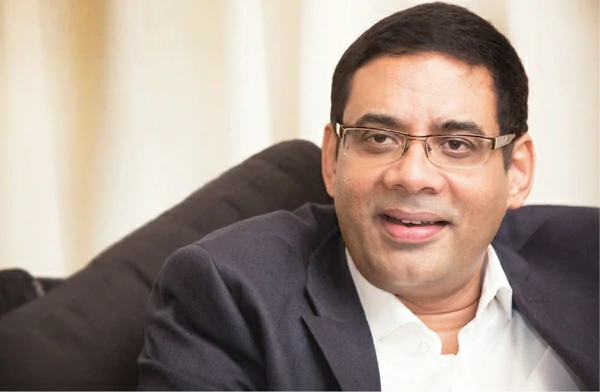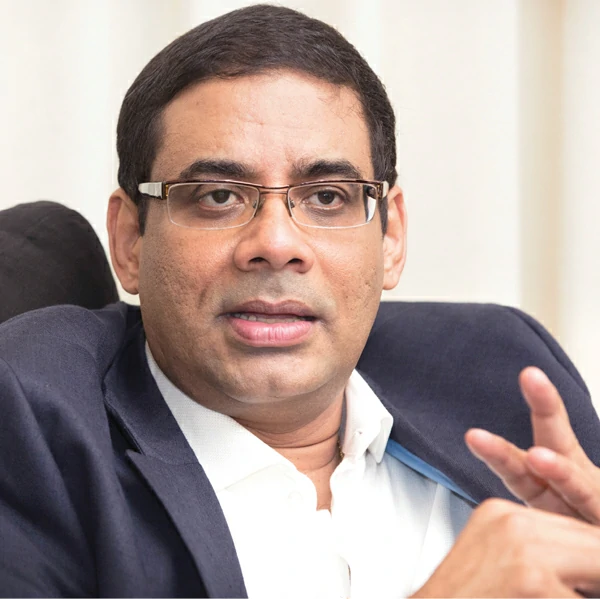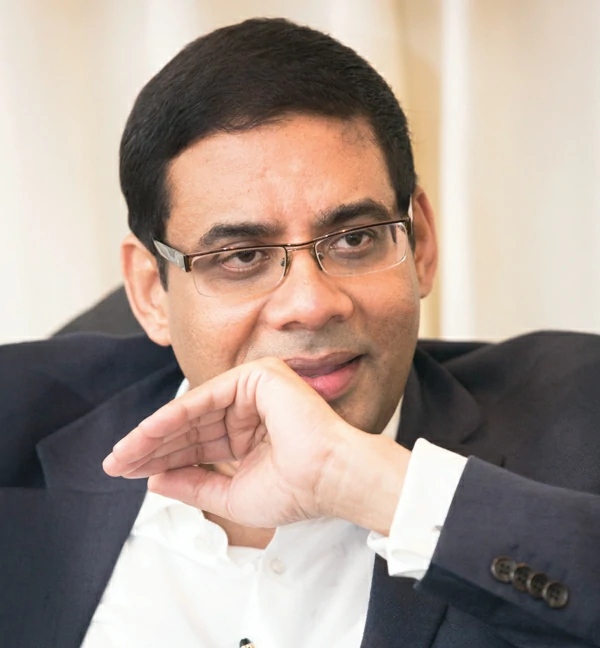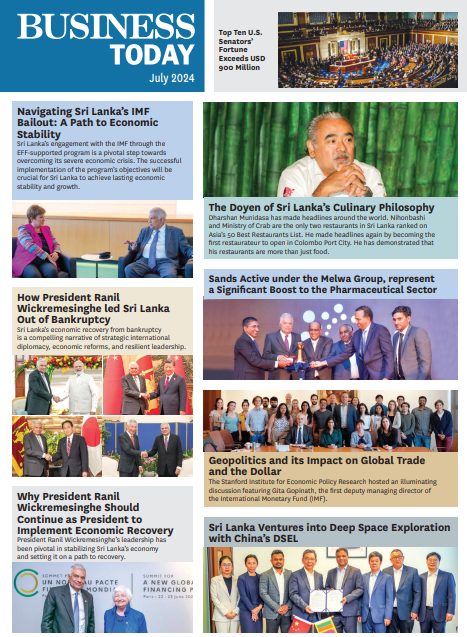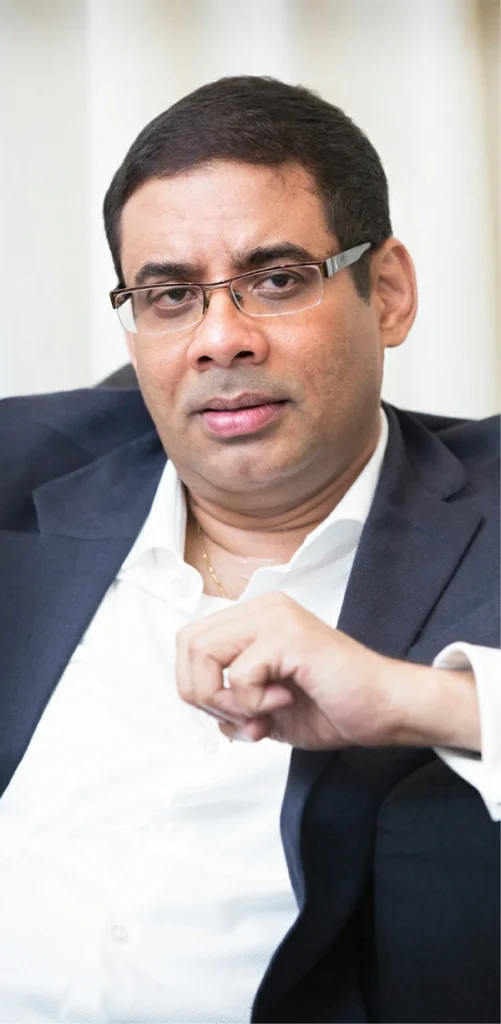
Dinesh Weerakkody currently serves in several honorary advisory roles in the current administration in the Skills Development, Policy Formulation, Economic Affairs, Tourism Development and Health areas. He is the former chairman of Commercial Bank of Ceylon and is a director of several listed and unlisted companies, and chairman of the apex National Human Resource Development Council of Sri Lanka. He is a strong personality in both the political and corporate arenas, where he works to ensure that the two sectors support each other. Dinesh Weerakkody works closely with Prime Minister Ranil Wickremesinghe. He speaks to us about the many areas in which he works and stresses that the private sector needs to be more involved.
Photography Mahesh Bandara and Vishwa Tharmkulasingham
You wear many hats in the government as well as in the corporate sector. Who is Dinesh Weerakkody?
I would say, a person committed to making this country a better place. I am keen to bring people together to make progress on important national issues, such as access to good education and creating productive employment opportunities for our youth. My experience in both the private sector and public sector is helping me to do this objectively.
I have been working with the leaders of this country for many years and have worked with President J R Jayewardene, President R Premadasa and Prime Minister Ranil Wickremesinghe. I did not get involved recently but have been working with the UNP for many years.
I got involved with the government and the public sector because I am interested in good governance. I feel that it is the responsibility of the private sector to get involved without staying on one side and complaining.
As far as the public sector is concerned, there are agreed objectives: I chair the National Human Resource Development Council, in the Ministry of Economic Affairs I keep an eye on the financial sector, again, human resource development, and also on the regulatory side. I generally engage with the stakeholders and based on their feedback, present reports to the government.
I Got Involved With The Government And The Public Sector Because I Am Interested In Good Governance. I Feel That It Is The Responsibility Of The Private Sector To Get Involved Without Staying On One Side And Complaining.
I wrote four of the proposals of the 100-day programme – the first one was the creation of a million jobs, secondly, providing employment for unemployed graduates for which I did a paper, thirdly, banking sector consolidation, and the fourth one was to increase education spending from two and a half per cent to six per cent. Those are the policy papers I presented for the 100-day programme and in time they will be implemented.
How do you manage both your state sector and private sector responsibilities?
I focus on results and on the impact that those results could have on society and the stakeholders I work with. Now to achieve those results, I try to put the right person in the right place. For me, skills and competence are key to achieving results.
What is the main focus of the Sri Lanka Human Resource Development Council?
Skills development is an important component of national development. The demand for job-specific technical skills in Sri Lanka is high, due to the structural changes taking place in the economy. The demand for skills will continue to intensify as the country transforms itself into an efficiency-driven middle-income economy. Recognizing the importance of skills and the implications of skills constraints for the country’s economic growth is a top priority for the government. For a start, we need to do a comprehensive assessment of Sri Lanka’s skills development sector, focusing on technical and vocational education and training by understanding the skills supply and demand, skills gaps and mismatches, system management, governance and financing. We need to go beyond the standard measures of skills in terms of enrolment and completion rates by looking at skills in three broad categories: cognitive, technical and soft skills. Although our labour force is the most educated in South Asia with the highest literacy rates and the highest pre-tertiary enrolment and completion rates, the job-specific skills supply is trailing behind some markets with which we compete.
How do we improve our country’s skill levels so that the country is in a better position to achieve economic growth and reduce poverty?
Firstly, we need to identify the demand drivers and employers’ needs for skills, then the skills supply of the workforce and how skills are formed by our education institutions and training providers, and then set the strategic direction for skills development.
Finally, we need to ensure the system is managed and financed properly. The voucher system proposed by the Prime Minister many years back could be a viable solution to push many of the training providers to buckle up and deliver what the market needs.
What are some of the big HR challenges faced by Sri Lanka?
Every year an estimated 140,000 to 150,000 students complete general education without having acquired job-related skills. Since the capacity of the Sri Lankan higher education system is limited, the TVET system is the main means to close the gap. However, serious deficiencies in the system prevent TVET delivering the required output, thus risking Sri Lanka’s goal of becoming a competitive middle-income economy. Along with skills shortages in a number of fields and occupations, Sri Lanka is also experiencing both underemployment and youth unemployment. The other challenge we have is to ensure that our workers have the skills which a modern competitive economy requires, such as computer knowledge, soft skills and English. The current education and training system does not do much to shape the soft skills required that are in high demand for a wide range of occupations. The public sector capacity building is another area that needs urgent investment. Some of the other problems we have are in organization and management – for example, excessive centralization, responsibility overlaps and poor accountability; access – regional disparities, low-quality instruction, inadequate qualification of instructors; lack of incentives – absence of links between performance and rewards, relevance and; information – lack of visibility of skills needs and social stigma attached to technical training. Therefore, to expand the supply of skilled and employable workers, we need to increase the quality of our training interventions.
Sri Lanka Has Progressed Significantly In Increasing Access To Primary Education. Sri Lanka Has One Of The Highest Literacy Rates In The World; However, The Quality And Relevance Of SL Human Resources Is A Growing Concern.
Then job training, internships, project work must be facilitated by easing the restrictions imposed by various out-dated laws. In addition, re-tooling and competency accreditation needs to be mandated as in other markets.
What would be the major drivers of skills demand in Sri Lanka in the next five years?
I would say it is economic growth, labour migration, urbanization, expansion of primary and secondary education, demographic change, tourism, technology and most importantly, FDI.
Sri Lankan employers complain more often about the lack of an adequately-educated labour force. Is this true?
Our employers point out that TVET is not relevant to their needs and question the quality of its curricula. There are mismatches between the skills that employers demand. The mismatch is especially severe in higher levels of education that is GCE A-Levels and above, TVET and job-specific and soft skills. As the absorptive capacity of the public sector is shrinking, the private sector is becoming the main source for job creation. Yet employers are not fully integrated into planning, provision, and regulation of the skills they need to make job creation a reality. Skills development in Sri Lanka is yet to become truly demand-driven and aligned with the ever-changing needs of the economy and the world.
What are some of the strategies of the current government to address these issues?
Sri Lanka has progressed significantly in increasing access to primary education. Sri Lanka has one of the highest literacy rates in the world; however, the quality and relevance of SL human resources is a growing concern.
The changing economy has created new demand for new technical and soft skills, but the supply has been more on semi-skilled/unskilled or skills with low demand. The quality and relevance of skills has still not been addressed in consultation with all the key stakeholders. There is a need for a conceptual framework. I believe the shortage and the mismatch of skills is due to a lack of an integrated national HR plan/skills development plan.
Supply of relevant job specific skills required by the labour market is essential to sustain economic growth. We must have the skills we need to support the growing economy, to reduce the gap between the ‘haves’ and ‘have-nots’ and also to export our labour to meet emerging international labour market demands.
I would say our priorities should be to: strengthen governance and management with more focus on results and efficient use of our resources, improve the quality and relevance of skills development by engaging all stakeholders, expand access to quality skills training and, strengthen the capacity of the apex body to set policy and monitor.
You chaired a committee appointed by the government to review the consolidation road map for banks and finance companies mandated by the previous regime. What was the outcome?
Firstly, consolidation of financial institutions per se is not harmful, as an excessive number of licences have been issued, specifically to the non-bank financial sector. However, the proposed consolidation process was seen as a forced initiative, as banks and NBFIs were requested to submit the preliminary consolidation proposals by March 31, 2014 and implement most of the consolidation plans within the year, with dates set by the Central Bank of Sri Lanka for mid and end 2014.We said voluntary consolidation of banks is a normal business activity and this should be actively encouraged by the new government by providing the required legal framework and removing impediments and the disincentives that have prevented institutions from taking that route. The decision to consolidate should be driven by the banks themselves and not by the state. No bank would get engaged in a merger or an acquisition unless it is done to benefit all the stakeholders. However, since some stakeholder groups may oppose consolidation to safeguard their own vested interests, the regulator can encourage consolidation by implementing a differentiated regulatory regime depending on size and strength of the institution as measured by key prudential factors.
Does the Banking Act and Directions need reform?
Certainly, the Banking Act and Directions needs revision. It is overly prescriptive. The directions also need to be revised. The Monetary Board should study and implement some of the recommendations made.
The involvement of the state in private sector banks is being criticized and the current government is also continuing that trend. What are your views on this?
The involvement of the government in private sector banks must be reduced. This can be either through the application of the same aggregated shareholder limits as applicable to private shareholders or by placing a cap on aggregate voting rights. On the question as to whether the government is interfering in the running of the banks, Minister Dr Harsha De Silva, I remember, said the current government has no choice but to restructure the boards because of some bad appointments and that more still needs to be done and will be done. Thereafter, they should be strictly left alone other than enforcing the shareholder rights that are available to any shareholder.
The Involvement Of The Government In Private Sector Banks Must Be Reduced. This Can Be Either Through The Application Of The Same Aggregated Shareholder Limits As Applicable To Private Shareholders Or By Placing A Cap On Aggregate Voting Rights.
How do we ensure that the finance companies from now on do not pose any risk to depositors?
The CB Road Map for Finance Companies was designed to broad base the capital structure of the sector and therefore addressed only one aspect of the problem facing NBFIs.
What are required to create stable NBFIs are much broader reforms. Therefore, in my view, consolidation to reduce the existing large number of players is a good thing, but that is only one aspect of the corrective action required to create stable NBFIs. There are more than 50 NBFIs registered with the Central Bank; the NBFI sector has many challenges around capitalization, governance structures, attracting talent, technology, and the regulatory framework also needs to be tightened up. The issuance of new licences at will over the years has not helped the sector to move up. On the other hand, independent prudential regulators have not been appointed for certain segments in the financial sector such as microfinance and pawn brokering, which are not covered by the Banking Act or the Finance Companies Act. Therefore, the poorer segments of the population will continue to be exposed to pyramid schemes and the consolidation of financial institutions does not seem to address this segment.
Merging of financial institutions: your views?
The consolidation drive of the previous government, I believe, was for two reasons: to avert the failure of some NBFIs having negative net worth or not in a healthy financial situation and to enhance the size of the larger banks to increase their borrowing capacity, as the private banks are being encouraged to increase their foreign borrowings.
However, my view is that no institution should be forced to take over or merge. The voluntary consolidation of business institutions is a normal business activity and this should be encouraged. When businesses go into such consolidation voluntarily, they take the needed measures to protect their own interests and would not participate in any consolidation unless it is business-efficiency driven. To encourage acquisitions or mergers, greater flexibility should be given to choose the partners and general incentives can be offered such as tax concessions for a limited period, as in the case of incentives given for listing of companies. Consolidation can also take away healthy competition and encourage oligopolistic behaviour. Besides, when there are only a few big banks and finance companies, the regulator may have to face a situation where they are too big to fail and thereby become a burden to society to rescue them at a great cost.
Year-to-date, the CSE has dipped by 12 per cent, with over 400 billion rupees in value wiped off. What are your thoughts on the introduction of Capital Gains Tax?
Given that the daily trading volumes are very thin, bringing in a Capital Gains Tax could be counter-productive; it could be more appropriate for the Government to reinstate the Share Transfer Levy. Also, there are many practical difficulties in implementing Capital Gains Tax.
The Timing Is Just Right For The Tourism Industry. The Industry Is Set For A Major Boom In The Next Few Years. In The Next Five Years, Tourism Will Evolve To Be One Of The Main Drivers Of Our Economy.
What is the potential for the tourism sector?
The timing is just right for the tourism industry. The industry is set for a major boom in the next few years. In the next five years, tourism will evolve to be one of the main drivers of our economy. The increase in the tourist arrivals in the past few months, especially last month, where we saw nearly 25 per cent growth year on year, augurs well for the future. The government wants to double the tourist arrivals by 2020 and make tourism the largest foreign exchange earner for the country at the same time. According to the latest data, tourist arrivals last year were around 1.8 million with a daily spend of around $160. This year the target is 2.5 million tourists. By 2020 we hope to nearly double this to 4.2 million tourists. These are realistic figures based on current trends. Nearly 200 new hotel properties, including small boutique hotels, are due to open by 2018. This will add over 11,000 new rooms to the country’s existing rooms inventory. In addition, all these properties will have food and beverage outlets, spas and various other amenities on offer. So the potential for the industry is tremendous.
As a destination, how competitive are we to attract new tourists and encourage repeat tourists?
This country lacks nothing when it comes to natural resources. Our beaches are world-famous. For long years, we were obsessed with our beaches and never ventured into the sea itself. The oceans around us are filled with rarely-sighted species such as whales and dolphins. The tourism industry has wasted no time in promoting these discoveries. Whale and dolphin-watching in Mirissa in the south of the country and in Kalpitiya in the north-western region of the country are now popular with tourists. In addition, Arugam Bay is fast emerging as a global surfers’ paradise. Unlike the Maldives which can only offer the sun and sea, we have a 2,500-year history to showcase to the world, and the eight World Heritage Sites we boast, which offer an unparalleled window into much of this rich culture and history. Then we have our wildlife parks, which have exotic wildlife. Sri Lanka has the highest biodiversity per 10,000 square kilometres in the whole of Asia, and is one of the 25 biodiversity hotspots in the world. Our hill country offers a unique experience where one could spend time in our world-famous tea gardens which is an altogether different world – the cool climate, the abundance of waterfalls, and breath-taking mountain vistas offering panoramic views. In addition, there are numerous activities for the sports-seeking tourist such as water sports all around the island, the newest of which is kite-surfing in Kalpitiya, white water rafting in Kitulgala, adventure parks in Ella and much more. All this can be experienced in a matter of a few hours. We are also looking at developing air links across the country so that any part of the island is accessible in less than an hour. Our value proposition is very different to some of our direct competitors.
The tourism sector is set to expand. Does the sector have the required manpower to service four million tourists by 2020?
According to a National Human Resources Development Council NHRDC study, the tourism industry will need to have around 130,000 newly-trained personnel by 2020, based on the four million tourist-arrivals target. The tourism industry overall, based on arrival forecasts, will add around 350,000 direct and indirect new jobs by 2020, according to the report. In Sri Lanka, there are 98 registered training programmes with 141 programmes offered around Sri Lanka. According to the report, 118 programmes have no quality certification and only 23 are certified. Many hotel groups also conduct their in-house training using internally-developed programmes, many of them high quality. The report said the industry will be better served if these courses are also registered and certified to allow accreditation. Around 197 new hotels, around 11,700 new rooms, catering to all levels, will start their operations (2015-2018) that will immediately require newly-trained personnel, putting enormous pressure on the TVET sector. The requirement of trained employees in the up-coming new hotels should be met by the Sri Lanka Institute of Tourism and Hotel Management (SLITHM) launching improved curriculum and training programmes and increasing the intake in consultation with the TVET sector.
I Have The Highest Regard For Both The President And The Prime Minister. I Have Worked With The Prime Minister Since The Mid-90s. He Is A Man On A Mission. His Lifelong Dream Has Been To Make Sri Lanka A Better Place Where All Sri Lankans, Irrespective Of Race Or Religion, Could Enjoy Good Living Standards And Be Treated As Equals.
SLITHM curriculum also needs to be offered through other institutions and that would require the government to strengthen the institution. The large hotel groups would, however, manage their manpower requirements through their internally-generated training programmes. The industry going forward, according to the report, needs to create a new employment value proposition to attract talented young people into the industry and in addition deliver the training and certification programmes where there is a higher concentration of hotels, without centring all their efforts in the Western Province. The report also said the current capacity or intake into our training and learning centres is only 8,600 – that will have to increase significantly.
Quality and delivery also need to improve. Though several universities are producing hospitality, tourism and events management graduates, most of these programmes are not current, and the UGC should therefore consult the industry to determine their value to the industry and redo their programmes. The report also says that depending on the type of tourists Sri Lanka hopes to attract in the future, the current skill levels will have to move up to mirror the new expectations of the customer.
As one of the people who played an important role in bringing the current administration together, are you happy with the way the country is progressing?
I have the highest regard for both the President and the Prime Minister. I have worked with the Prime Minister since the mid-90s. He is a man on a mission. His lifelong dream has been to make Sri Lanka a better place where all Sri Lankans, irrespective of race or religion, could enjoy good living standards and be treated as equals. Passing of the 19A was a big victory for freedom, democracy and good governance. Some of us got involved purely to create that change. The other significant achievement was the substantial reduction in the cost of fuel and electricity during the 100 days. Going forward, we certainly need to address some of the key policy issues and strive to get the right skills to run the government. Public service capacity needs to be ramped up immediately; until then, we need to bring in the required skills from outside. We should avoid putting incompetent public servants in key positions, both locally and abroad, or retired people to key positions, in the name of good governance. For key positions, people should be appointed based on their integrity, skills and current performance, as in Singapore. The bottom line is that we need people who are credible, current and have the skills and competencies to make a difference. Sri Lanka needs to build a good team, another Ronnie de Mel, Ranasinghe Premadasa, Lalith Athulathmudali, Gamini Dissanayake and Ranil Wickremesinghe combination.
Why are people complaining that very little is happening?
There is some confusion in the market on the policy front and this may have resulted in an overall slowdown in decision-making on some fronts, as you say. But then this government is only eight months old and a government of two parties. All this will surely change and would be changed to bring about the visible change that was promised under the Yahapalanya. For the government, the first priority, second priority and the third priority must be development. Therefore, inviting foreign investments and embarking on massive infrastructure projects like the Mahaweli with foreign aid (as Sri Lanka lacks the capital) is a must. The Prime Minister is looked upon favourably by the West. It’s up to him, therefore, to leverage on those advantages in order to kick start the economy.
Many say Sri Lanka’s external finances are in a mess. Is this correct?
The external financing situation is certainly very challenging. In 2015 the trade deficit was around 8.5 billion dollars. Worker remittance was around 6.9 billion dollars. Capital flows were negative. We had a Balance of Payment deficit of 1.5 billion dollars. The upside in 2015 was tourism – 3 billion dollars – a 24 per cent increase. My view is that if the trade deficit hangs around 7 billion dollars, the higher income from tourism, exports and technology services could help our Balance of Payments to have a surplus. However, there are many other challenges for our external finances like the stability of the rupee, declining reserves and capital flows. Our export income is only around 55 per cent of our imports. My view is that we should in the short term limit the foreign debt financing only for projects that have multiple benefits for the economy, focus on debt refinancing, attract more FDI by introducing investment-friendly policies and re-structure the BOI to support that drive and manage the export trade supply side.
Is the government facing a major debt crisis?
Our total government debt at the end of 2015 was 81 billion dollars. Out of this, foreign debt was around 60 per cent. Analysts say our total debt will touch 103 billion dollars this year – around 98 per cent of revenue and foreign debt will increase to 57 billion dollars this year. Today, public debt is almost 100 per cent of GDP. Therefore, there is lot of work that needs to be done, given that we have a BOP deficit of 1.5 billion dollars from 2015 and to cover off short term loans got at exorbitant rates taken for unproductive projects such as the Mattala Airport that needs to be renegotiated. The IMF SAF should help the economy to ride over this crisis; however, the policy direction to improve the supply side is a must as well as a tightening of fiscal and monetary policies.
The Important Thing Is Not To Sit Back And Wait. Society Has A Role To Play In Ensuring That Whoever Is Elected Delivers On Their Promises.
In the last 12 months, has Sri Lanka improved its foreign policy in order to maximize its strategic interests internationally?
In the past, Sri Lanka was overly dependent on haphazard and reactive arrangements. In fact, the country lacked any coherent message on relevant issues with contradictory statements being made by local politicians and diplomats. This has now significantly changed for the better. However, given the economic and socio-political shift that has occurred internationally and the need for active international engagement, which is basically leveraged upon the pursuit of economic objectives, good economic diplomacy can increase our ability to play a constructive role in building a more prosperous Sri Lanka. To me, the distinction between foreign and domestic issues today is no longer explicit, as the global financial crisis of 2008 proved. Local actions have ripple effects abroad. Therefore, given its strategic location within South Asia, Sri Lanka stands to benefit from a more skilful foreign policy. That, however, requires people with experience, skills and competence to understand how foreign policy is made and conducted in the new world.
Future plans?
People ask me whether I will get into politics: not immediately, because I like the private sector. Maybe in another five years, when I get more experience in government affairs, I will consider entering politics but not right now. I prefer to be in the private sector, stay out and help the government and ensure that we keep the government together. In fact, I mentioned that to the President and Prime Minister, as well. I would like to play a role to keep the government together – that would be far more important than taking a role in the government.
What is your real motivation to get engaged in national issues?
In many developing countries, people elect leaders for five to six years, watch in silence while they do what they desire for that period and then attempt to throw them out in disgust and hope for a better deal from the next government. This attitude of electing dictatorship is not the essence of democracy. Civil society, on an on-going basis, should hold political leaders accountable and responsible for their actions. However, to achieve this, there has to be more activism and advocacy on the part of all civic groups and, of course, a greater involvement in politics by all sections of society. More than ever, today, civil society has a special role to play in reducing the bitterness of politics in our country. In Sri Lanka, the polarization and divisive nature of Sri Lankan politics has without doubt prevented the emergence of a national consensus and greatly obstructed the peaceful resolution of the North and East problem. Therefore, I believe that the only way in which greater political consensus can be achieved is if the professional and middle classes of the country become politically active and make greater demands from their elected leaders, without watching in silence.
Final thoughts?
The important thing is not to sit back and wait. Society has a role to play in ensuring that whoever is elected delivers on their promises. Society also needs to engage in important national issues without staying at home and criticizing the government.
